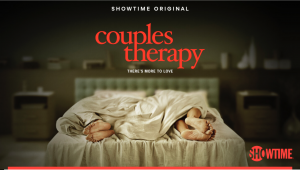‘Couples Therapy’ Season 3 Part 2 demonstrates how the guilty party’s coping mechanism fails to reflect reality
Category: Television and StreamingThe ‘wild experiment’ turned the TCA Award-winning Couples Therapy follows the world-renowned psychologist/psychoanalyst Dr. Orna Guralnik as she guides couples through the rough waters of long-term relationship/marriage.
The second part of Season 3 returns to Showtime featuring four new couples: Brock & Kristi, married 15 years; Sean & Erica, married 8 years; Josh & Natasha, together 4 years; and Nadine & Christine, together 16 months. In previous seasons, Guralnik showcased and demonstrated that it was possible to find common ground with someone who saw the world quite differently than we did. In this installment, however, reaching common ground seems ever more elusive than before compounded by the fact that the younger generation is disillusioned with monogamy and questions what it means to be in a relationship.
It is heartbreaking to see the cheaters — Kristi, Sean, and Nadine — push for ‘forget-the-past-and-move-on’ tune-up while the cheated — Brock, Erica, and Christine — suffer mentally, emotionally, and physically right in front of their eyes. The remorseless cheaters hide behind the walls they’ve built as a way of avoiding those parts of the self that remain unpalatable and unacknowledged; shame, guilt, fear, inadequacy, resentment, and then some. It’s no wonder why Guralnik simply cannot identify/find/see them.
“Monogamy is a farce,” vents Sean from the get-go. His dismissiveness as well as gaslighting rhetoric present a therapeutic challenge to Guralnik; what is he hiding or defending himself against? After much trial and error, Guralnik is successful in bringing out the little boy who was deeply wounded by his mother’s constant reminder that he is nothing but a dyslexic screw-up. His childhood wound that evokes shame and self-loathing is the reason why he avoids anything and everything that make him feel bad about himself.
Kristi, on the other hand, proudly claims that her affair has nothing to do with Brock and wonders why the most exhilaratingly liberating and healing experience of her entire life could be the point of contention. Duh! Seriously? This is far more layered than Sean’s case.
Call it thwarted revenge or harbored resentment toward Brock who ‘sacrificed’ her for years in the Mormon Church in order to maintain the institution of marriage! All sorts of breaches happened between them and how they arrive at some sense of trust is the issue here, but her downright refusal to promise not to hurt him again, snarky remarks, and nasty glares suggest that this is not a negotiation of differences, but rather a ‘Kristi’s War to End All Wars’; she hopes the resolution will come if only Brock understands her and stops being cruel to her. If looks could kill, Brock would most certainly have died a painful and excruciating death a thousand times.
As long as Brock represents a threat to Kristi’s hard-earned freedom from church, patriarchy, and family, and richly-deserved sense of control over her life, there’s no way she is jumping back into any kind of confinement, let alone her marriage — the stifling patriarchal and sexist institution to control women. The High and Mighty Kristi simply cannot stand in the space of being the person who has harmed her husband on purpose. It’s always easier to blame anything or anyone, but yourself and dodge accountability by making Brock responsible for her heinous actions.
Unlike the unexpressive or checked-out participants from earlier seasons, the victims in this installment stand up for themselves, articulately express their feelings and ask for what they need. Good for them! Therefore, in this installment, Guralnik acts as an archaeologist to excavate the participants’ pre-existing self-sabotaging behavior, particularly the ‘enigmatic unconscious’ since they don’t always know what’s motivating them and what’s at play. At the same time, she performs as an interpreter for the gaslighters’ view of reality spoken in gibberish. “How do you conduct therapy when people are not committed to truth and honesty?” Guralnik’s frustration is certainly not lost on me.
About the Author
Meg Mimura is a TV critic who actually watches shows zealously in search of thought-provoking and paradigm shifting human drama worth our precious time. She is a member of Television Critics Association. Follow her on Twitter.

